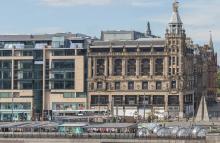
Many residents breathed a sigh of relief after the withdrawal in recent days of the application for a licence to run 37–49 Albany Street as a 42-person house in multiple occupation.
For the last 4 years, the building (formerly operating more conventionally as the Albany Hotel) has been used as an unlicensed HMO by the Council.
During that time, some locals have witnessed or been victim to unacceptable levels of anti-social behaviour, disruption, violent crime, prostitution, youth crime and drug dealing associated with groups and individuals operating in and around the property.
It now appears that many of the recent occupants there, including those who caused the trouble, have been moved elsewhere. The premises seemed deserted when Spurtle visited yesterday.
However, we understand the Licensing Sub-Committee has voted through one of up to two 3-month extensions of the usage as the Council struggles to find viable alternatives. Donald Turvill reported 12 exceptional exemptions like this (freeing up 250 beds) in Friday’s Herald.
Ward 11’s Cllr Joanna Mowat is briefing locals on developments as and when they become clear.
Wider issues
The problems on Albany Street have coincided with Edinburgh Council using the property as an unlicensed HMO in an emergency response to the city’s homelessness problems, despite such use of unlicensed property being against the law.
On 13 November 2024, the Housing, Homelessness & Fair Work Cmte (HHFWC) approved an action plan to move Council tenants out of such unlicensed properties by the end of the month, and to find other ways to meet its simultaneous legal obligations to provide temporary accommodation for homeless people in the Edinburgh area.
Background
Edinburgh already had problems with homelessness, but when the Covid-19 pandemic was declared in March 2020, the Council urgently needed to find additional safe, warm and affordable housing in order to comply with public-health and safety requirements.
Officials, who faced unprecedented service pressures at the time, insist that, at least, unlicensed properties were checked and where necessary upgraded for safety before people moved in. And that they have been pressing property owners to meet full compliance requirements ever since.
In many instances, for a variety of reasons, owners have declined to do so.
Serious housing problems have continued post-Covid. This is due in part to the removal of ‘local connection’ requirements, early prison releases, changes to the welcome accommodation policy for Ukrainan Displaced People, and accelerated asylum decisions.
The Council declared a Housing Emergency in November 2023.
In February 2024 the HHFWC set out a Housing Emergency Action Plan to tackle social, legal and financial risks stemming from the use of non-compliant property.
A Monitoring Officer’s report on 26 September 2024 made clear the Council’s legal dilemmas.
Another report to the HHFWC on 1 October 2024 showed that, on 31 August 2024, 1,430 of the 5,123 Edinburgh households in temporary housing were in unsuitable accommodation. And that on 1 October, of 770 temporary accommodation spaces still available in unlicensed HMOs, 709 were being used.
HHFWC’s decision on 13 November to stop using unlicensed HMO accommodation by the end of the month has been made possible by temporarily suspending the Council’s current Homes Letting Policy (with some exceptions for disabled people and those awaiting hospital discharge.)
This will allow resources to be focused on making new homes available and bringing old accommodation up to scratch.
What next?
There is a complicated web of hard-to-resolve issues behind Edinburgh’s housing crisis, details of which are impossible to describe briefly and lie way beyond the scope of this article.
One of the most obvious is that solving the problem will cost money, at a time when sufficient funds are hard to find.
The consequences of international turbulence, long-term social deprivation, continuing high levels of family breakdown and domestic violence have always affected all of us. But they may soon become more apparent on more people’s doorsteps in more places across Edinburgh, more of the time. Because, as the Council seeks long-term solutions, it will also need short-term fixes. Suitable accommodation across all parts of the city will be required, including privileged areas like Albany Street where life has mostly been calm and comfortable and relatively unproblematic in the past.
And to anyone gloating at short-term-let owners unable to gain Council planning consent for their businesses to continue … pause for a moment and consider. Pessimists not unreasonably wonder where those propertied entrepreneurs will turn next for an alternative steady source of income.
Homelessness, and the causes of it, are shared societal problems. When their effects arrive at your doorstep, it isn’t pleasant, obviously, but it’s certainly equitable and and a timely reminder at Christmas that all of us should share that societal burden.
Perhaps political solutions will come more quickly when fewer voters can ignore the local consequences of more widespread social failures.
Got a view? Tell us at spurtle@hotmail.co.uk or on X at spurtle@hotmail.co.uk or on Bluesky at spurtle@bsky.social
-------




